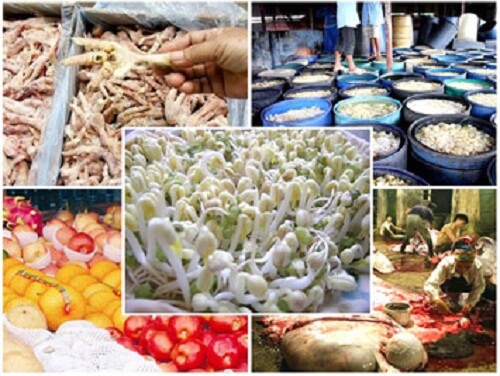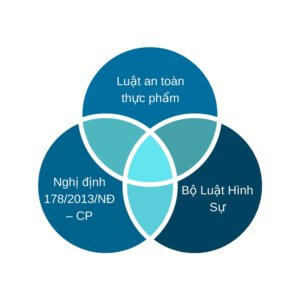Government to tighten food safety violation
In recent years, the news and the press have repeatedly point to the terrible food scandals that caused the rumors. Although the authorities have intervened to sanction violations of food safety regulations, they only stop at the administrative sanction, which do not bring the best deterance against individuals, organizations benefit nefarious from dirty food. Moreover, according to the Penal Code at that time, sanctions are only imposed on individuals, so an enterprise is hard to be prosecuted as a legal entity. Therefore, in order to overcome the above limitations, the 2015 Penal Code (which came into effect on July 1, 2016) has imposed tougher and more feasible sanctions.

Dirty food appear on a large scale in recent years
Kizuna will introduce more clearly the documents of violation handling and the latest additions to the sanctions against food safety violations of the Penal Code, which are applied more closely to each violator.
Documents of violation handling
To handle violations in the field of food safety, authorities worked mainly with 3 main documents:

I / Food Safety Law
Food Safety Law No. 55/2010 / QH12 regulates general rights and obligations of organizations and individuals in assuring food safety. The Law on Handling of Food Safety Violations, specifically in Article 6, Clause 1: “Food producers and traders that violate the law on food safely shall, depending on the nature and severity of their violations, be administratively handled or examined for penal liability. If causing damage, they shall pay compensations and remedy consequences under law. “
II / Decree 178/2013 / ND-CP regulating the sanction of administrative violations in food safety.
To guide as well as give more specific sanctions for each violation, Decree 178/2013 / ND-CP contains provisions and levels of administrative sanctions. Specifically in Article 4: Regulations on fine levels and competence to sanction individuals and organizations include some important information as below:
- The maximum fine level imposed for each act of administrative violation on food safety shall be 100,000,000 VND applicable to individuals and 200,000,000 VND applicable to organizations.
- The fine level for a same administrative violation committed by an organization shall be equal to twice of the fine level imposed for an individual.
In fact, the profit from dirty food production and trading is much higher than the above administrative punishment, so many individuals and organizations are willing to pay the penalty and then continue their violation.
III/ Penal Code 1999-Amended and Supplemented 2009
The Penal Code 1999 contains specific provisions on food hygiene and safety violations in Article 244, including 3 penalty frameworks corresponding to 3 different levels of danger and 1 clause regulating additional penalties.
- Those who process, supply or sell food which, they know, fails to meet the criteria on safety and hygiene, causing loss of life or serious damage to the health of consumers, shall be sentenced to between one and five years of imprisonment.
- Committing the crime and causing very serious consequences, the offenders shall be sentenced to between three and ten years of imprisonment.
- Committing the crime and causing particularly serious consequences, the offenders shall be sentenced to between seven and fifteen years of imprisonment.
- The offenders may also be subject to a fine of between five million dong and fifty million dong, a ban from holding certain posts, practicing certain occupations or doing certain jobs for one to five years.
According to many subjective and objective assessments, the above provisions when applied to the actual violation lead to many inadequacies. For example, serious harm to the health of the user has not yet been given specific guidelines to determine the nature of the consequences of the incident, from which the corresponding penalty is imposed. Because there are many foods that only take effect after 5 to 10 years. Moreover, because of the lack of specific guidelines, the authorities can only handle administrative violations and it is really difficult to have a legal basis for criminal prosecution.
New changes in the sanctions take effect from July 1, 2016
The fact that dirty food appears on a large scale and the danger of serious health effects that it has on the population, it is necessary to give more stringent sanctions, severe criminal prosecution for serious cases.
The Penal Code 2015 officially comes into force on July 1, 2016 and Article 317 indicates the level of strict and specific sanctions for each violation. Let’s check out some important information as below:
- Those who commit one of the violations such as using banned substances, chemicals or improperly processed products, etc. shall be subject to a fine of between 50,000,000 VND and 200,000,000 VND or sentenced to between one year and five years of imprisonment.
- Committing the offense: causing death to 1 person, causing damage to health from 31% to 121%, gaining illicit profits of 100-500 million VND, re-violation, etc., shall be subject to a fine of 200,000,000 VND to 500,000,000 VND or Imprisonment from 3 years to 7 years.
- Committing the offense: causing death to 2 people, causing damage to health from 61% to 200%, gaining illicit profits of 500 million to 1 billion VND shall be sentenced to between 7 and 15 years imprisonment.
- Phạm tội: gây chết 3 người trở lên, tổn hại sức khỏe 61% – 201%, thu lợi 1 tỷ trở lên thì bị phạt tù từ 12 năm đến 20 năm. Committing the offense: causing death to 3 or more people, causing damage to health from 61% to 201%, gaining illicit profits of 1 billion VND or more shall be sentenced to between 12 and 20 years imprisonment.
- Offenders may also be subject to a fine of between 20,000,000 VND and 100,000,000 VND, banned from holding certain positions, practicing certain occupations or doing certain jobs for one to five years.
In conclusion, more specific provisions on the severity of each violation will contribute to help authorities enforce more severe cases of violations. At the same time, the new Law also deters individuals and organizations who are intent on gaining nefarious revenues from dirty food, causing serious harm to human health. Stricter management from related agencies to control the food industry also contributes to creating a healthier playground for businesses, organizations and individuals who produce, trade in clean and safe food.
We hope the above information on handling violations of food safety in Vietnam helps and we will continuously provide the lastest news for you.
By Marketing Department-Kizuna JV Corporation